- Home
- Octavia E. Butler
Survivor Page 3
Survivor Read online
Page 3
“You know English,” I said, “and I know Garkohn. In the exchange, haven’t we become friends?”
Now she yellowed, just slightly. “I think you are a fighter.”
“When I have to, I fight. You know that we don’t divide ourselves into clans as you do.”
“I know.” She sighed, then suddenly flared yellow. “Sometimes it is foolish to make individual friendships among foreign fighters. But we will try a little foolishness.” Her coloring settled back to normal. “Perhaps soon you will have a friend highly placed.”
“So?”
“I…you will say nothing of this to anyone?”
“I’ll say nothing.”
“I’m going to challenge the Third Hunter. I can beat him. I know I can.”
I was impressed. I had seen the Third Hunter and he was impressive. If Gehl really thought she could beat him…
“Natahk knows,” said Gehl. “He says my ambition will kill me. He knows that if I beat the Third Hunter, I will take on the Second.”
“But you will not challenge Natahk himself, after that?”
She gave me a look of yellow disgust. “I do want to live, Alanna. I only challenge where there is a chance for me to win. No Garkohn would challenge Natahk until he is old and weak.”
I grinned. I had not seen anyone among the Missionaries who would have dared to challenge the massive Garkohn leader either. Not without a gun in his hand, at least.
“Come tonight and eat with my parents and me,” I told her. “Soon you may be too busy for such things.”
She looked thoughtful. “I can bring Ihiateh?”
I tried to hold back, but suddenly I found myself laughing aloud. “Bring him, Gehl, but…”
“I know.” She whitened. “He already knew some Missionary ways and he told me. I think he would have beaten me yesterday if he could have. I won’t provoke him here among your people again.”
Alanna passed through the high gates of the stockade with the raiding party and saw before her a town far more finished than it had been when she was abducted. There were more houses now. The settlement was much like the walled town the Missionaries had lived in back on Earth. As on Earth, the houses and storage buildings were grouped comfortably around a wide expanse of open land held in common by all the people. The common was landscaped as it had been on Earth with one difference. For some reason, there was no grass—no neatly cut lawn for the people to sit or lie on. There were a few flowers—Earth flowers—flourishing in the alien soil. There was bare hard-packed ground, and there were tall meklah trees connected to each other by thick benchlike roots. Clumps of trees formed natural gathering places. Or the people could gather in the open as they were doing now around the raiding party. The Missionaries who had stayed behind and the several Garkohn who happened to be at the Mission settlement gathered around the raiding party just in front of the largest fragment of the ship that was left intact—the great, nearly hollow shell that served as the Mission Church.
Alanna found herself struggling to comprehend the words of welcome and congratulation that came both in English and in Garkohn. Both languages spoken quickly and carelessly sounded oddly foreign to her. More than once, she found herself mentally translating them into Tehkohn as though Tehkohn was her native language.
During the first moments, she was jostled but otherwise ignored by people eager to greet relatives or get a look at the prisoners. Missionaries in particular came to stare with a mixture of hostility and curiosity at the silent Tehkohn.
Finally, people began to notice Alanna. Her clothing attracted them. She was clearly a woman and yet she was dressed in pants and a short belted tunic—clothing forbidden by the Missionary interpretation of Deuteronomy 22:5, which they chose to enforce strictly. “The woman shall not wear that which pertaineth unto a man, neither shall a man put on a woman’s garment: for all that do so are abomination unto the Lord thy God.” Thus Neila Verrick had quoted when Alanna, fresh from the wilds where she had gone almost naked, complained about the bothersome long dresses all Missionary girls and women wore. Alanna had never taken the prohibition seriously. As soon as the Tehkohn asked her what she needed to keep her furless body warm, she had described her present clothing to them. An artisan had managed to turn out exactly what she wanted and she had worn it in warmth and comfort ever since.
Now the Missionaries came to stare at her and at her strange clothing. She looked at their furless faces with interest. Many of the men had beards but that was not the same as the all-over fur covering of the Kohn. Through much of her time with the Tehkohn, she had longed to see another Earth-human face. Sometimes she had felt alone and more lonely than she ever had in the wilds of Earth—a different kind of loneliness. Now, finally, she was surrounded by the faces she had longed to see, and she felt herself to be among strangers. She felt confused, vaguely frightened. People spoke to her and she did not answer them.
“Alanna!”
“You’re Alanna Verrick, aren’t you?”
“Don’t you remember me, Alanna?”
“Were you with those animals all this time?”
“Hey, Alanna…”
They clustered around her, greeting her, welcoming her home, while she longed desperately to be at home. To be at the home she had left in the mountains. To be away from this crowding shouting gesturing mob. What was wrong with these people? The raiding party had not behaved this way.
Since she would not speak, the people began to talk about her rather than to her.
“It is the Verrick wild human, isn’t it?”
“It’s her all right—though dressed like that…”
“Why doesn’t she say something?”
“You know, she never was too bright.” This from an older woman who had never quite been able to forgive Alanna’s wild-land origins. “Maybe she’s forgotten how to speak English.”
“Why not,” said someone else. “The Tehkohn had her almost as long as we did.”
Then Neila Verrick was there, hurrying through the crowd, her face wet with tears. “Alanna! Oh, it is you. Alanna, girl…”
In Neila’s arms, Alanna found her first moments of peace within the stockade. Her fear and her feelings of isolation began to ebb and she could smile at the woman who had become her mother. She could start to feel at home.
Now she grew more aware of her body’s discomfort. Now she had relaxed enough to concern herself with mere discomfort. She was hungry and weary and in need of meklah. The meklah need was only strong enough to emphasize her hunger, so far, causing her to feel as though she had been without food for many hours longer than she actually had. It was only nightfall—a half day since Natahk had forced her into readdiction. But she had eaten nothing since then, nothing for most of the day except that single yellow fruit.
It did not matter. For the moment, nothing mattered as she greeted her foster mother. She could hear people near her asking questions again. How had she survived? What had the Tehkohn done to her? Where were the other captives? Only this last question made any impression on her. There were people around her whom she recognized now as relatives of those who had died in the Tehkohn prison room. She did not want to tell them that their relatives were dead. She was still too close herself to the pain of losing a loved one and she did not want to watch as that pain replaced the hope in these people’s faces. Now was the time to concentrate on keeping the living alive, not on mourning the dead.
Still without speaking, she let Neila lead her into the Verrick cabin.
The main room of the cabin was as cluttered as she remembered it, full of the tools, furniture, and utensils of Missionary life. The room was used for cooking, for eating, for almost any work that could be done indoors, and simply for gathering together and taking pleasure in each other’s company. The room, like Neila’s presence, helped Alanna to bridge the two-year gap and rejoin herself to her Missionary past. She needed that past now to help her know how best to reach the Missionaries through their xenophobic shield. With a l
ittle rest now, and food, she would be ready to begin on Jules and Neila.
But weary as she was, she saw that she was not to be left alone yet. Just before Neila shut the door, a tall Garkohn huntress slipped in fully camouflaged. Neila seemed not to see her, but Alanna saw her plainly, marveled at her carelessness. No Tehkohn would use camouflage so poorly and expect it to be successful. But clearly the Garkohn got away with it at the Mission settlement. Or they had been getting away with it. Now was the beginning of the end of that. Alanna greeted the huntress quietly.
“Gehl”
The huntress dropped her camouflage, became as visible to Neila as she had been to Alanna. Beside Alanna, Neila jumped, made a quick “Oh!” of surprise.
“Alanna,” murmured Gehl. This huntress had taught Alanna the Garkohn language and in return, Alanna had taught her English. Two years ago, Gehl had been a friend. Even now, with all the changes that had taken place, Alanna realized that she was glad to see the huntress. Gehl’s presence, like Neila’s, made the settlement seem more like home. But Gehl was Garkohn. Did she come now as persona] friend or tribal enemy.
“Your eyes are good,” said Gehl in English.
“Very good,” agreed Alanna.
“And you are strong—even stronger than I thought you were. In my life, I have never seen anyone return alive from Tehkohn captivity.”
“Your strength was promising too,” said Alanna. “What is your rank now?”
“Second, as I said it would be.”
“So. And it has cost you.” There was something wrong with Gehl’s left eye. Alanna had not noticed it at first. Over the eye’s natural deep green, there was a white film.
“It was worth the price,” said Gehl.
“Can you see out of that eye?”
“No. It doesn’t matter.” It mattered, and Gehl knew it. Her blind eye coupled with her high position would increase the number of her challengers dramatically. And every challenger would strike at her one good eye. Sooner or later, someone would hit it. But that was Gehl’s problem.
Alanna shrugged. “Are you with Natahk now?”
“We are together.” She switched to Tehkohn abruptly. “Though I have been less fortunate than you.”
Alanna lifted her head slightly and answered in Tehkohn. “You’ve already spoken to Natahk then.”
“So.”
“And after hearing what he had to say, you still think me fortunate?”
Gehl looked away. “No. I would not have wished you…that pain. Not even now when we must cause each other pain.”
“Must we? We were friends once.”
“Fighters of different tribes ask for pain when they form friendships.”
The two stared at each other for a moment. Then Gehl turned and walked out of the house.
“What was all that?” asked Neila.
Alanna rubbed a hand over her face. “That was the end of a friendship.”
“Because you were captured by the Tehkohn?”
“Yes. And because I survived.”
“She would rather you had died?”
“I don’t think so. She just can’t trust me any more.”
“You have an accent,” said Neila softly.
Alanna turned to look at her. “Accent?”
“You speak English with an odd accent. Tehkohn, I suppose. That may be what bothered Gehl.”
“I’ll get rid of it as quickly as I can. It might bother people more important than Gehl.” Alanna paused, looked at her foster mother with concern. “Does it bother you?”
Neila hugged her again. “Of course not. I’m so glad to have you home, nothing could bother me. Come over here. Look.” She led Alanna to Alanna’s old bedroom, small, clean, the bed made as though it was still in regular use. “People said, ‘Why don’t you turn it into a storage room now?’” Neila smiled. “And I said, ‘Because I don’t believe Alanna is dead. I’ll believe it when our men have gone to the Tehkohn dwelling and found out for themselves.’ It was the Garkohn who convinced everyone that you and the others were dead.” She frowned. “Alanna…what about the others?”
“They really are dead.”
“Oh.” Neila turned away, her head bowed. Alanna went into the tiny bedroom that had been hers, saw the large wooden chest that held her clothing and possessions. It paralleled the bed on the opposite side of the room, leaving not much more than a T-shaped passageway to move in. There were curtains at the one small window and a cloth of the same pattern covering the chest. The bed was covered with a heavy quilt that had once belonged to one of Jules and Neila’s three children. The bedroom was as simple as the main room was cluttered. It was as simple as the rooms Alanna had shared with her husband.
She went back to Neila, started to lift her hand in a Tehkohn gesture of affection that had become second nature to her. But she caught herself and let her hand fall to her side before it touched Neila. She spoke quietly.
“I’m going to rest a little before I do anything else. I’m so tired…”
“How did you survive, Alanna?”
“I’ll tell you about it—you and Jules—as soon as he comes in. I just want to rest a little first.”
Neila said nothing, but as Alanna retreated to her room, she could feel her foster mother’s gaze following her with curiosity. Innocent dangerous curiosity.
CHAPTER THREE
Diut
We captured Alanna along with eight others of her kind and twelve Garkohn. The Garkohn, we knew, would die during their period of cleansing. They had been dependent on the meklah for too many generations ever to be cleansed. But as far as we knew, their strange new allies, who called themselves Missionaries, had only just come to the poison. We thought some of them might survive.
I realized later that if I had separated the Missionaries from the Garkohn—shut them in different rooms for cleansing—more Missionaries might have lived. As it was, they were unnerved by the fatalism of the Garkohn. Alanna said later that several of them gave up their lives almost without a struggle when they saw how completely the Garkohn had given up.
As it was though, I knew almost nothing of the Missionaries. They had joined themselves with the Garkohn and I had decided to treat them as Garkohn until they proved otherwise. Only Alanna gave me the proof I sought. Only she lived.
When the five-day period of cleansing was over, I went to the room where she and the others had been held. My fighters were cleaning the room and clearing out the corpses for burning. I saw her, strangely colored, furless, very thin after her ordeal, covered with filth. I thought she was dead, but as I was about to turn away from her, she moved. I brought her water from a pot on one of the carts my hunters had brought in. The water was for washing the room, but none of it had been used yet. I knelt beside Alanna, spoke to her in Garkohn.
“Can you understand me, Missionary?”
She turned her face to me weakly and I could see that it was cut and bruised. Her eyes were swollen shut. I supposed that she was still in pain. There is no gentle way to rid one’s body of the poison and become clean.
She made a sound that was not a word and I realized that she could not speak. She had become so hoarse from screaming in pain that her voice was temporarily gone. From my cupped hands, I gave her water to drink. She swallowed it eagerly. I would not let her have as much as she wanted or let her drink it as quickly as she wanted. I had seen enough of my Tehkohn survive the meklah to know how easily she could make herself sick again.
I looked around the room at my fighters. “Who captured this Missionary?” I asked.
“I did,” said one of my judges. Jeh. He was loading the body of a Garkohn huntress onto the cart that would take the dead out for burning. He threw the dead woman onto the cart and came over to us. He is a friend, Jeh. We were children together, though he is older. I sided with him when he broke tradition and began a liaison and then a marriage with the huntress Cheah. He is a well-colored judge, and she, a well-colored huntress. Neither of their clans wished to have them
marry out. But they fought all challengers for their right to do so, in accordance with ancient custom. When they had each beaten their challengers and the people continued to complain, I said “Enough.” I was still very young then but the people obeyed me. Jeh and Cheah were left alone. Now Jeh looked down at the Missionary he had captured.
“I thought she might live,” he said. “She almost took my eyes when I caught her. And three days ago, Cheah and I found her crawling out of this room.”
“She found her own way out?”
“Yes. By accident perhaps.”
“Or perhaps not. Her people may not all be as blind as our watchers think.”
“None of them saw our watchers.”
I let my body whiten a little. “None saw them and knew them as Tehkohn, no. But to people as different as this one,” I touched Alanna with my foot, “Tehkohn and Garkohn must look much alike.”
“Our watchers say this one is the daughter of the Missionary leader.”
“So? That may be important in the future—if you can keep her alive now.”
“Cheah and I will care for her if you wish.”
I flashed positive white. “It would be best for fighters to care for her now. You will be able to handle her when her strength returns.”
He looked from Alanna to me. “Aside from tending her injuries, what care shall we give her?”
“Begin teaching her our language, our ways—as in the old stories. There was a time when Garkohn survived the cleansing and our ancestors made good Tehkohn of them.”
“But she is so different…”
“She is. But I wonder how much the differences matter. We will let her show us. Through her we will learn more of what her kind can do—more of what the Garkohn might use them for.”
Jeh flashed white assent, then bent and lifted Alanna. She moaned as though in pain. Her pain was almost at an end though, if she proved tractable. Jeh and Cheah would treat her kindly. Kindness was best. She might be a valuable hostage someday. Meanwhile, it would be interesting to watch her change—to help her change. I would take part in her re-education myself. And I would see to it that if she was ever returned to her people, she would greet them as an emissary of the Tehkohn. She would speak to her parents for me and against Natahk.

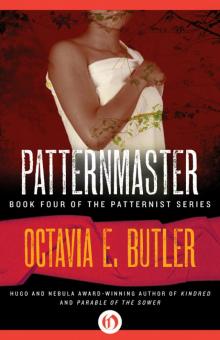 Patternmaster
Patternmaster Survivor
Survivor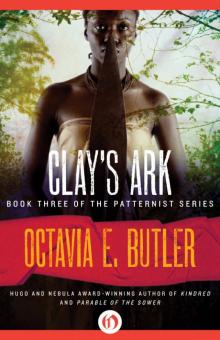 Clay's Ark
Clay's Ark Bloodchild and Other Stories
Bloodchild and Other Stories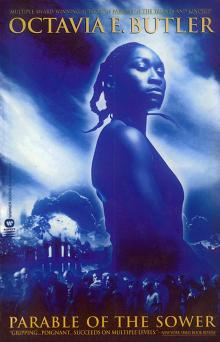 Parable of the Sower
Parable of the Sower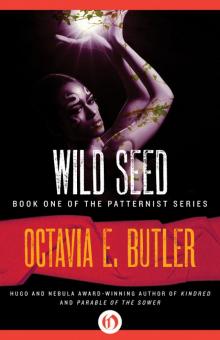 Wild Seed
Wild Seed Fledgling
Fledgling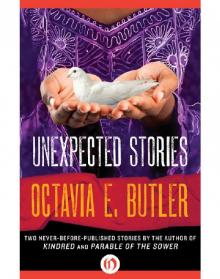 Unexpected Stories
Unexpected Stories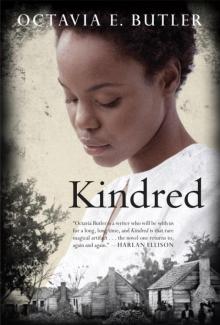 Kindred
Kindred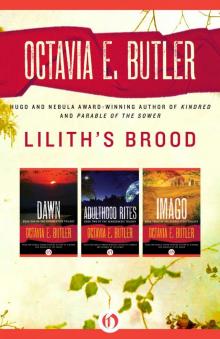 Lilith's Brood: Dawn / Adulthood Rites / Imago
Lilith's Brood: Dawn / Adulthood Rites / Imago Adulthood Rites
Adulthood Rites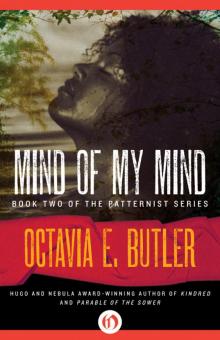 Mind of My Mind
Mind of My Mind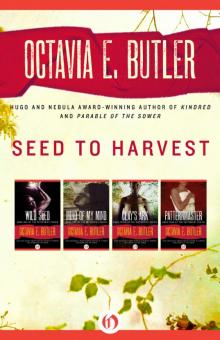 Seed to Harvest
Seed to Harvest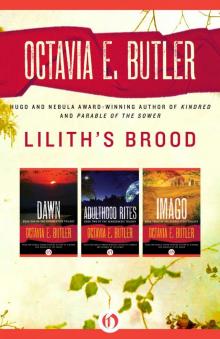 Lilith's Brood: Dawn, Adulthood Rites, and Imago (Xenogenesis Trilogy)
Lilith's Brood: Dawn, Adulthood Rites, and Imago (Xenogenesis Trilogy) Bloodchild
Bloodchild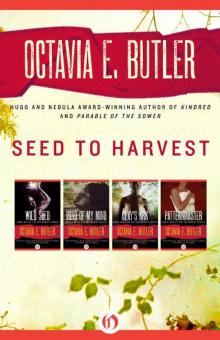 Seed to Harvest: Wild Seed, Mind of My Mind, Clay's Ark, and Patternmaster (Patternist)
Seed to Harvest: Wild Seed, Mind of My Mind, Clay's Ark, and Patternmaster (Patternist)